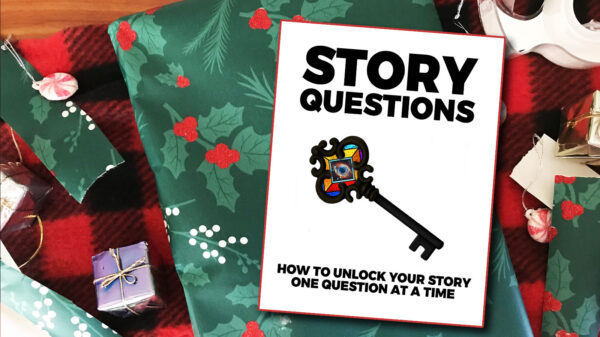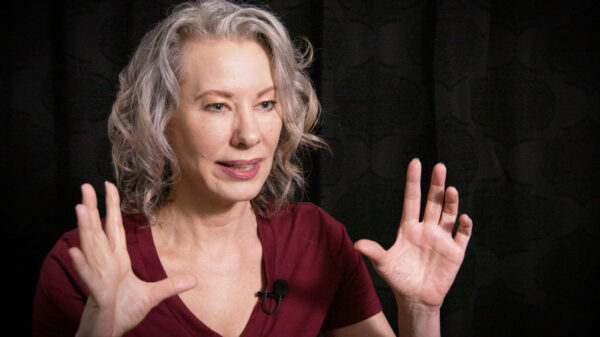
TORRI R. OATS – WRITER/PRODUCER – ‘No Lies Told Then’
.
Film Courage: Where did you grow up? What was life like at home?
Torri R. Oats: I grew up just outside of Ann Arbor, Michigan in a middle-class, two parent home. I had everything I could possibly want in terms of material things. To hear my mother tell it, I only wanted educational things, so it was easy to say “yes.” As a child I was sad and lonely. I was shy, nerdy and struggled with the way I looked so I didn’t have many friends my age. I spent a lot of time creating worlds and characters in my head or writing them down.
My mom and aunts used to take me to the Fox Theater in Detroit whenever a new black play would come to town. After seeing another play with a similar storyline, I remember telling my mom we were seeing the same plays over and over. I wanted some originality. This was the moment when I thought a career as a writer was possible.
In hindsight, being a lonely, shy child allowed me to be an empathetic adult. In hindsight, those plays that lacked originality made me starve for creativity. My childhood allowed me to keep probing deeper and deeper into the lives, and psyche, of the characters I would create. It was my childhood that propelled me closer to my dreams.
Film Courage: Which of your parents do you resemble most?
Torri: Definitely my mom. She’s my buddy.
Film Courage: Did your parents lend support toward creativity or encourage another type of career/focus?
Torri: I think they tried to be supportive. Like all parents, they wanted me to have a better life and to them that meant making big bucks. They always knew I was creative and I can remember my mom suggesting a career in media because she thought I belonged in front of the camera, but that wasn’t me.
There was a turning point though. The night my mom saw my first play she took me to the side and told me I made the right decision by moving to New York. I wasn’t searching for my parents’ approval, but I never knew how much I needed to hear it until that night.
.
.
Film Courage: Did you go to film school?
Torri: No, I didn’t. I wanted to, but looking back I’m glad I didn’t. I spent so much money on film books and magazines trying to follow the rules and it paralyzed me. I couldn’t write. When I stopped thinking about structure, I was writing freely and couldn’t stop.
Film Courage: You asked this question, “If you could become anything, achieve anything in this moment, what would you be?” As the first question in your four-week Twitter campaign. What is this campaign all about? How would you answer that question?
Torri: We crafted four questions, each dealing with themes of the film. When I watch a movie, I want to be challenged; I want to think; I want to feel. These questions are an exercise designed to challenge viewers to do some self-examination, enhancing the film-going experience. We want them to connect to the film and our hope is that the campaign will help to do that.
If I could become anything, achieve anything in this moment, I would make this film with the cast and crew we want, and facilitate a dialogue that endures long after the film leaves theaters.

Film Courage: Tell us about the writing process for No Lies Told Then.
Torri: I was writing a series of one act plays titled “A Literal and Figurative Exploration of Life and Death.” There was one with a little girl who was five years old. She loved to sing and dance. She was this incredible little girl so full of life and energy, and she got under my skin and I couldn’t forget her.

I kept thinking there was more to her story, but I didn’t know what that was. One day, I was listening to Nina Simone’s “Little Girl Blue” and I started writing for that same little girl, Sandy. Only this time, she was 13. I had the song on repeat because to me there was a connection between the lyrics and Sandy. I wrote the first draft very quickly, but she kept talking to me, giving me more of her story.
Film Courage: How much time did you spend on the first draft?
Torri: The first draft took maybe two weeks. I was writing at a crazy pace.
Film Courage: Did you really write over 50 drafts? Why so many?
Torri: Yes, and I think 50 is a conservative number. The director and I would meet each week and read every line aloud. We were meticulous about it. If something didn’t quite work, we’d talk it out and I’d go back and rewrite that part. Neither of us want our first film to be one that was thrown together. We have one shot and we’re not going to waste it. We’re passionate about film, and quality, and we want to make sure it will withstand criticism and will be something we’re proud to have our names attached to.
Film Courage: After so many drafts, how did you know you had your final one?
Torri: Sandy stopped talking and there was literally nothing left to pick apart.
Film Courage: Who did you give the script to for feedback?
Torri: Friends, family, film lovers, and those who attended film school. I even posted an early draft on a site for feedback.
Film Courage: Why does this story need to be told?
Torri: When I was a kid, I wondered why no one who looked like me lived inside the television. It was strange that I would see all of these white people living full lives with careers and loved ones, but I didn’t see characters that reflected my image.
While we see more women of color in film and television, seeing us as fully realized human beings isn’t as common as I would like. The protagonist in No Lies Told Then is a black woman, but her journey could be like any one of us. She knows love. She knows loss. She knows what it’s like to have dreams much bigger than you think you can reach. She knows what happens in that moment when you look in the mirror and wonder, “how did I get here?” She is all of us. This film is necessary because we’re all so busy moving from place to place, thing to thing, just existing. But, how many of us are truly living? That is what this film is about.
Film Courage: With the script complete, what are the steps you are taking to get this movie made?
Torri: Right now, we’re focused on building our audience through our four-week campaign and we have something planned after it’s finished. We’re talking to community members in Harlem and building relationships. We’re having conversations with other filmmakers to learn from them. Next month, we’re going to start location scouting.
Film Courage: How is your experience directing and producing two off-Broadway plays helping you make your first feature film?
Torri: Well, the plays taught me to put aside my ego. The first one was way too long, so I had to edit it down with the actors. It was tough losing those lines, but it was in service of the work. The other thing I learned was to be resourceful. Don’t be afraid to ask for help. You’d be surprised how people will respond.
.
.
Film Courage: No Lies Told Then is sponsored by non-profit Fractured Atlas. What can you tell us about this partnership?
Torri: With fiscal sponsorship, donations made to the film are tax-deductible to the full extent of the law. I knew this would help to open the door to grants. Fractured Atlas is a non-profit organization that supports the arts. We are able to use their tax-exempt status to fundraise and apply for grants. They also have relationships with Indiegogo and RocketHub, helping to reduce the crowdfunding fees. They also read our grant applications to make sure we are in compliance with their rules and the law.
With each donation, they receive a fee but it’s a small price to pay for the services they offer.
Film Courage: How long have you been planning the film? What went into the pre-planning?
Torri: That’s a tough question to answer. I wrote the first draft eight or nine years ago and wanted to produce it then. At that point, the indie film market had somewhat crashed and crowdfunding didn’t exist. It wasn’t feasible, so I put it on the shelf.
For the past two or three years, it has been almost my sole focus. Once the script was finished, the work really got started. We drafted a budget, created a mood reel, wrote a draft of the donor plan, drafted two more budgets and a more extensive donor plan. Then we started the location list and the list of DPs we would like to work with. Most recently, we created our version of a trailer. We now have all the tools and we’re working on audience building.
Film Courage: Favorite female directors?
Torri: Ava DuVernay, Gina Prince-Bythewood, Amma Asante, Nicole Holofcener, Jane Campion.
Film Courage: How do you command respect and keep a good morale on set?
Torri: It starts with the hire. I’m pretty easy going and egoless when it comes to work, so I hire people who are similar in that respect. I read people very well, so if I sense something is off I’ll pull them to the side and probe until I get an answer. It’s all about the work and everyone I work with knows they have a voice that will be heard. I’m not afraid to be wrong. It’s always about the project.
Film Courage: Do you think women directors or leaders have a tougher balance enforcing rules and keeping things running on set?
Torri: I think for a lot of people, the answer is “yes.” A few weeks ago, I was working with the director and sound designer on a piece. We had two actors recording voiceovers. While we were recording, the sound designer asked a number of questions and as a result, I was re-writing on the fly. After we saw his first cut, we were discussing something particular. The two men deferred to me because I really was the boss.
I do think sometimes women may have a harder time asserting themselves, because when and if we do we’re called names. To change that, we need to watch who we work with and stop hiring people who do not respect our authority.
Film Courage: You created a mood reel using clips from existing films, is this one of the tools you are pitching to investors?
Torri: Yes it is one of our tools. In addition to the mood reel, an animation studio in London, Fudge Animation, created an animatic which is visually stunning. This will help to propel our pitch efforts and securing investors and supporters of the film.
Film Courage: What do you want audiences to gain from watching No Lies Told Then?
Torri: Again, we want them to reflect on their own lives. We want them to think about their dreams. Are they living them? Have they given up? Too many people lament on what could have been, but we want people to have the courage to recalibrate the direction of their life. We hope this film will illuminate and enlighten.
Film Courage: Do you do other creative things?
Torri: I sketch from time to time. I write poetry, essays and short stories. I’ve tried sculpting but I don’t think I have the patience.
Film Courage: Where do you develop your best ideas?
Torri: I always have ideas when I don’t have a pen or computer nearby. When I’m on the bus or train, for example. When I am awake on public transportation, I like to look at faces and create backstories. Sometimes seeing a particular person at a particular time will inspire a character. I think my best ideas come while I’m in the shower.
Film Courage: Biggest supporter in your life and why?
Torri: My mom. She listens to all my crazy ideas. Reads my best and worst work. She believes in me and I never want to disappoint her, so each day I’m striving to make her proud.
Film Courage: Quote or mantra you live by?
Torri: Give voice to the voiceless. I’ve been blessed my entire life and I’m not going to waste it. There are too many people suffering, too many people who are lost, too many people who do not have a voice. I want to give them one.
Film Courage: What’s next for No Lies Told Then?
Torri: The next few months we’re focusing on #noliestoldthen and our various audience-building campaigns. We’ve been very methodical in how we’ve approached things, so we’ll continue to be smart and patient as we take this step by step.
Film Courage: Where is the best place to keep up with No Lies Told Then for anyone who wants to follow your journey?
Torri: Follow us on Twitter at @NoLiesToldThen. Check out our website at Noliestoldthen.com and subscribe to our newsletter. For those looking for further information regarding our current campaign.
Film Courage: For anyone who connects with your story and wants to help you make this movie, what steps can they take to get involved?
Torri: Donations help to push this film even further, so when they visit our website they have the option to to make a tax-deductible donation by clicking the “donate” button in the top right-hand corner. Also, telling your friends and family about the film, asking them to follow us on Twitter and check out our website, is equally important. Feel free to tweet us and we’ll respond. Keep the conversation going and don’t be afraid to reach out.
BIO:
Torri R. Oats, a Harlem-based writer, operates on the credo “to give voice to the voiceless.” She has contributed to Madame Noire, The Atlanta Post and has written, directed and produced two off-Broadway plays. Her written pieces challenge authority and portrays positive images of underrepresented groups. No Lies Told Then, is Torri’s first feature film.
.
CONNECT WITH TORRI:























